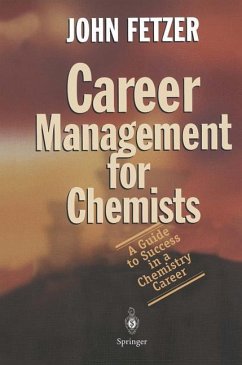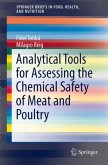Building a successful career in the sciences depends on more than good technical knowledge and research skills. Communication and interpersonal skills, as well as personal traits, are often decisive factors in the level of advancement and satisfaction that can be achieved. But where do scientists, from new graduates to mid-career professionals, go for insights and advice on how to plan, manage or reengineer their careers? Now John Fetzer's "Career Management for Chemists" provides ample, common-sense guidance on the key topics such as:
Resumés and CVs, Staying Driven & Current, Personal Skills & Traits
Networking, Teamwork & Leadership, Speaking & Listening
Writing Research Papers, Mentoring, Behavior & Rewards
Evolved and expanded from Fetzer's popular column "Building Professional Careers in Chemistry," which runs monthly in the journal Analytical and Bioanalytical Chemistry, the practical coverage reflects not only his long professional experience but also his insight that, especially in today's changing workplace, expectations and strategies for career management require constant re-evaluation.
Resumés and CVs, Staying Driven & Current, Personal Skills & Traits
Networking, Teamwork & Leadership, Speaking & Listening
Writing Research Papers, Mentoring, Behavior & Rewards
Evolved and expanded from Fetzer's popular column "Building Professional Careers in Chemistry," which runs monthly in the journal Analytical and Bioanalytical Chemistry, the practical coverage reflects not only his long professional experience but also his insight that, especially in today's changing workplace, expectations and strategies for career management require constant re-evaluation.
From the reviews:
This book has an incredibly broad scope and looks at both technical and non-technical areas, from keeping research records to dealing with difficult people. It is steeped in chemical terminology and anecdotes based on situations common to chemists, and so brings something fresh to the area.
Fetzer himself stresses in the introduction that everyone works for themselves and that you can't rely on anyone else to control or shape your career. Having established this essential truth, Fetzer shares his many years of experience in a style that is reassuring and supportive.
Although more experienced chemists may find many of his points veer towards the 'obvious', younger scientists will find his insights on aspects such as conferences, collaboration and publishing invaluable in helping them understand how to be effective and have impact in the scientific community. For me, the book's real strength lies in these sections, with it acting as a virtual mentor, sharing experiences and advice.
The scope of the book is such that the individual topics can only be covered briefly, but as an experienced columnist, Fetzer captures the key points, which for most readers is all that is required. For example, scientists who are keen to develop their careers towards a management role will find the sections on dealing with others and working in and leading teams offer a practical summary of many management theories. The comprehensive bibliography points those interested to further information.
...The advice offered is universal and relevant to chemistry careers in the UK and internationally. I feel this book will have most value to chemists at the start of their careers as it distils many years on experience into straightforward tips on being an effective scientist. However, anyone seeking guidance or support for their professional life will find much of value in Fetzer's encouraging and constructivebook.
Sara Shinton, Chemistry World, Vol. 1, No. 12, December 2004
"Career Management for Chemists provides ample, common-sense guidance on the key topics such as resumes and CVs, staying driven and current, personal skills and traits networking, teamwork and leadership, speaking and listening, writing research papers, behavior and rewards. ... reflects not only his long professional experience but also his insight that, especially in today's changing workplace, expectations and strategies for career management require constant reevaluation." (cpp 2005, Issue no. 2, 2005)
"A useful handbook for chemists at all levels and at all career stages. ... Not only are the chosen topics thought-provoking ... but consideration of such would be advantageous for any scientist to keep in mind while journeying through the years of a career. ... None of the career management books offers the combination of topics that Fetzer does, with the emphasis on one's career as a journey ... . would be useful for recent graduates ... ." (Mary B. Satterfield, Analytical and Bioanalytical Chemistry, March, 2005)
"John Feltzer believes that to be a good scientist one needs more than just good technical knowledge and research skills. ... He explains how to achieve in technical area by keeping on learning; being part of a scientific community; writing and reviewing for journals; diversifying etc." (Book News on the Internet, January, 2005)
"This is generally an almost exclusive view of the USA experience of science employment. ... Finding mentors (or being a mentor), how to deal with negative situations, learning not to fight a battle under your opponent's rules, how to avoid having one's ethics compromised by others, moving from "pure" science into management, are topics all covered in various chapters. ... A thorough reading, followed by regular re-reads as one's career develops, will almost certainly significantly enhance almostanyone's career pattern." (K. Jones, Chromatographia, Vol. 61(1-2), 2005)
"This book has an incredibly broad scope and looks at both technical and non-technical areas, from keeping research records to dealing with difficult people. It is steeped in chemical terminology and anecdotes based on situations common to chemists ... . will have most value to chemists at the start of their careers ... . anyone seeking guidance or support for their professional life will find much of value in Fetzer's encouraging and constructive book." (Sara Shinton, Chemistry World, Vol. 1(12), December, 2004)
"In a truly scientific way, Fetzer begins by exploring the technical requirements for a specialist scientific career. ... Fetzer clearly identifies ... issues, such as communication ... resume and interview preparation, skills assessment, teamwork and leadership. ... In clear text he leads the reader through each aspect, providing pertinent examples, many from his own experiences. ... The book is most readable and will provide useful guidance for all chemists ... ." (Alan French, Chemistry in Australia, November, 2004)
"John Fetzer's ... provides ample, common-sense guidance on the key topics such as: Resumes and CVs, Personal Skills & Traits Networking, Teamwork & Leadership, Speaking & Listening, Writing Research Papers, Mentoring, Behavior & Rewards. ... reflects not only his long professional experience but also his insight that, especially in today's changing workplace, expectations and strategies for career management require constant re-evaluation." (PROCESS Chemical and Pharmaceutical Engineering, Vol. 7(3), 2004)
This book has an incredibly broad scope and looks at both technical and non-technical areas, from keeping research records to dealing with difficult people. It is steeped in chemical terminology and anecdotes based on situations common to chemists, and so brings something fresh to the area.
Fetzer himself stresses in the introduction that everyone works for themselves and that you can't rely on anyone else to control or shape your career. Having established this essential truth, Fetzer shares his many years of experience in a style that is reassuring and supportive.
Although more experienced chemists may find many of his points veer towards the 'obvious', younger scientists will find his insights on aspects such as conferences, collaboration and publishing invaluable in helping them understand how to be effective and have impact in the scientific community. For me, the book's real strength lies in these sections, with it acting as a virtual mentor, sharing experiences and advice.
The scope of the book is such that the individual topics can only be covered briefly, but as an experienced columnist, Fetzer captures the key points, which for most readers is all that is required. For example, scientists who are keen to develop their careers towards a management role will find the sections on dealing with others and working in and leading teams offer a practical summary of many management theories. The comprehensive bibliography points those interested to further information.
...The advice offered is universal and relevant to chemistry careers in the UK and internationally. I feel this book will have most value to chemists at the start of their careers as it distils many years on experience into straightforward tips on being an effective scientist. However, anyone seeking guidance or support for their professional life will find much of value in Fetzer's encouraging and constructivebook.
Sara Shinton, Chemistry World, Vol. 1, No. 12, December 2004
"Career Management for Chemists provides ample, common-sense guidance on the key topics such as resumes and CVs, staying driven and current, personal skills and traits networking, teamwork and leadership, speaking and listening, writing research papers, behavior and rewards. ... reflects not only his long professional experience but also his insight that, especially in today's changing workplace, expectations and strategies for career management require constant reevaluation." (cpp 2005, Issue no. 2, 2005)
"A useful handbook for chemists at all levels and at all career stages. ... Not only are the chosen topics thought-provoking ... but consideration of such would be advantageous for any scientist to keep in mind while journeying through the years of a career. ... None of the career management books offers the combination of topics that Fetzer does, with the emphasis on one's career as a journey ... . would be useful for recent graduates ... ." (Mary B. Satterfield, Analytical and Bioanalytical Chemistry, March, 2005)
"John Feltzer believes that to be a good scientist one needs more than just good technical knowledge and research skills. ... He explains how to achieve in technical area by keeping on learning; being part of a scientific community; writing and reviewing for journals; diversifying etc." (Book News on the Internet, January, 2005)
"This is generally an almost exclusive view of the USA experience of science employment. ... Finding mentors (or being a mentor), how to deal with negative situations, learning not to fight a battle under your opponent's rules, how to avoid having one's ethics compromised by others, moving from "pure" science into management, are topics all covered in various chapters. ... A thorough reading, followed by regular re-reads as one's career develops, will almost certainly significantly enhance almostanyone's career pattern." (K. Jones, Chromatographia, Vol. 61(1-2), 2005)
"This book has an incredibly broad scope and looks at both technical and non-technical areas, from keeping research records to dealing with difficult people. It is steeped in chemical terminology and anecdotes based on situations common to chemists ... . will have most value to chemists at the start of their careers ... . anyone seeking guidance or support for their professional life will find much of value in Fetzer's encouraging and constructive book." (Sara Shinton, Chemistry World, Vol. 1(12), December, 2004)
"In a truly scientific way, Fetzer begins by exploring the technical requirements for a specialist scientific career. ... Fetzer clearly identifies ... issues, such as communication ... resume and interview preparation, skills assessment, teamwork and leadership. ... In clear text he leads the reader through each aspect, providing pertinent examples, many from his own experiences. ... The book is most readable and will provide useful guidance for all chemists ... ." (Alan French, Chemistry in Australia, November, 2004)
"John Fetzer's ... provides ample, common-sense guidance on the key topics such as: Resumes and CVs, Personal Skills & Traits Networking, Teamwork & Leadership, Speaking & Listening, Writing Research Papers, Mentoring, Behavior & Rewards. ... reflects not only his long professional experience but also his insight that, especially in today's changing workplace, expectations and strategies for career management require constant re-evaluation." (PROCESS Chemical and Pharmaceutical Engineering, Vol. 7(3), 2004)








